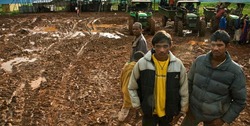Africa Intelligence | 27 September 2013

n°1364
Ethiopia: Land policy revised
After enabling foreign firms to grab vast stretches of land, the government has begun to review its land policy.
When in private, Ethiopian officials admit that the agricultural policy based on renting vast stretches of land to foreign firms at a low price has been a failure. The foreign companies have held on to the land for speculative reasons, and have frequently only cultivated small portions of it. Under this programme, 300,000 hectares were attributed to the Indian company Karuturi Global LTD (ION 1324) before the Growth and Transformation Plan (GTP) was adopted in 2010, after which a further 470,000 hectares were attributed to other companies under the said programme.
The companies benefiting from the scheme were authorized to raze forests for their agriculture projects and were given various tax sweweteners. However, despite these advantages “no company has fulfilled the government’s expectations” according to Bizualem Bekele, a director of the ministry of agriculture. According to him, “even Karuturi had only been able to develop 5000 hectares”. Bizualem’s team evaluated this land programme in July and made some startling discoveries: many of the investors did not have a precise idea of the type of land they wanted and some of them didn’t even know what a hectare of land looked like. Out of the forty three companies attributed agricultural land, several had subsequently withdrawn from the sector after benefiting from the tax advantages and sixteen are in a trial period. They have six months to start their projects, otherwise the State will claim back the land.
The results of the investigation by Bizualem’s team were passed on to the National Agriculture Investment Committee chaired by Prime Minister Hailemariam Desalegn in August. The committee considered the evidence and then made two important decisions: the government is to recover land that had been attributed to companies but not been used, and secondly to henceforth limit the amount of land attributed to investors in this sector. Following these instructions, the ministry of agriculture will limit the amount of land allocated to any potential foreign investor to 5000 hectares and will give priority to local investors, although in this case the land conceded by the State would be limited to a maximum of 3,000 hectares.

According to Bizualem Bekele, a director of the ministry of agriculture, “even Karuturi had only been able to develop 5000 hectares." (Photo: Petterik Wiggers)
n°1364
Ethiopia: Land policy revised
After enabling foreign firms to grab vast stretches of land, the government has begun to review its land policy.
When in private, Ethiopian officials admit that the agricultural policy based on renting vast stretches of land to foreign firms at a low price has been a failure. The foreign companies have held on to the land for speculative reasons, and have frequently only cultivated small portions of it. Under this programme, 300,000 hectares were attributed to the Indian company Karuturi Global LTD (ION 1324) before the Growth and Transformation Plan (GTP) was adopted in 2010, after which a further 470,000 hectares were attributed to other companies under the said programme.
The companies benefiting from the scheme were authorized to raze forests for their agriculture projects and were given various tax sweweteners. However, despite these advantages “no company has fulfilled the government’s expectations” according to Bizualem Bekele, a director of the ministry of agriculture. According to him, “even Karuturi had only been able to develop 5000 hectares”. Bizualem’s team evaluated this land programme in July and made some startling discoveries: many of the investors did not have a precise idea of the type of land they wanted and some of them didn’t even know what a hectare of land looked like. Out of the forty three companies attributed agricultural land, several had subsequently withdrawn from the sector after benefiting from the tax advantages and sixteen are in a trial period. They have six months to start their projects, otherwise the State will claim back the land.
The results of the investigation by Bizualem’s team were passed on to the National Agriculture Investment Committee chaired by Prime Minister Hailemariam Desalegn in August. The committee considered the evidence and then made two important decisions: the government is to recover land that had been attributed to companies but not been used, and secondly to henceforth limit the amount of land attributed to investors in this sector. Following these instructions, the ministry of agriculture will limit the amount of land allocated to any potential foreign investor to 5000 hectares and will give priority to local investors, although in this case the land conceded by the State would be limited to a maximum of 3,000 hectares.













